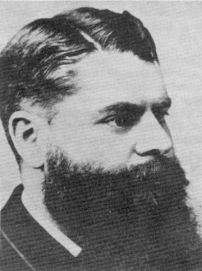George E. Davis
| George E. Davis | |
|---|---|
 | |
| Born |
July 27, 1850 Eton, Buckinghamshire, England, UK |
| Died | 1906 (aged 55–56) |
| Citizenship | British |
| Fields | Chemistry |
| Alma mater | Royal School of Mines |
| Known for | Founding father of chemical engineering |
George Edward Davis (1850–1907) is regarded as the founding father of the discipline of Chemical Engineering.[1]
Life
Davis was born at Eton on 27 July 1850, the eldest son of George Davis, a bookseller. At the age of fourteen he was apprenticed to a local bookbinder but he abandoned this trade after two years to pursue his interest in chemistry. Davis studied at the Slough Mechanics Institute while working at the local gas works, and then spent a year studying at the Royal School of Mines in London (now part of Imperial College, London) before leaving to work in the chemical industry around Manchester, which at the time was the main centre of the chemical industry in the UK.[2][3]
Davis worked as a chemist at Brearley and Sons for three years. He also worked as an inspector for the Alkali Act of 1863, a very early piece of environmental legislation that required soda manufacturers to reduce the amount of gaseous hydrochloric acid released to the atmosphere from their factories. In 1872 he was engaged as manager at the Lichfield Chemical Company in Staffordshire. In this job his capacity for innovation flourished. His works included what was at the time the tallest chimney in the UK, with a height of more than 200 feet (61 m).[1]
He married Laura Frances Miller on 10 December 1878, and they had at least one son.[1] He worked as a consultant to the chemical industry jointly with his brother Alfred, founded the Chemical Trade Journal and had 67 patents granted, as well as publishing scientific papers.[1]
Davis was also instrumental in the formation of the Society of Chemical Industry (1881), which he had wanted to name the Society of Chemical Engineering, and was its first Secretary.[4][5][1] He was also interested in microscopy, founding the journal Northern Microscopist in 1881, and publishing a textbook on the subject, Practical Microscopy.[1]
He died in West Dulwich, on 20 April 1907.[1]
Contribution to Chemical Engineering
Davis identified broad features in common to all chemical factories and wrote the influential A Handbook of Chemical Engineering. He also published a famous lecture series of 12 lectures, given in 1888 at Manchester Technical School (which became University of Manchester Institute of Science and Technology (UMIST)). These lectures defined Chemical Engineering as a discipline.[6][1]
His lectures were criticized for being common place know-how since it was designed around operating practices used by British chemical industries. At this time, however, in the United States, this information helped initiate new thinking in the Chemical Industry, as well as spark Chemical Engineering degree programmes at several universities in the US.[1]
Recognition
In the entrance to Jackson's Mill, the building that houses the School of Chemical Engineering and Analytical Sciences, University of Manchester, there is a display and memorial to Davis. The George E. Davis Medal of the Institution of Chemical Engineers is named in his honour.
Publications
| Library resources about George E. Davis |
| By George E. Davis |
|---|
- Davis, George E. (1904). A Handbook Of Chemical Engineering, (2nd ed.). Manchester: Davis Bros. VolumesI and II
- Davis, George E. (1907). Practical Microscopy. London: D. Bogue.
Further Reading
- TCE March 2012 52–4 "Meet the Daddy"
References
- 1 2 3 4 5 6 7 8 9 Freshwater, Don (2004). "Davis, George Edward (1850-1907)". Oxford Dictionary of National Biography. Oxford: Oxford University Press. doi:10.1093/ref:odnb/37345.
- ↑ "George E. Davis". Chemical Heritage Foundation. Retrieved 27 October 2016.
- ↑ Bowden, Mary Ellen (1997). "George E. Davis". Chemical achievers : the human face of the chemical sciences. Philadelphia, PA: Chemical Heritage Foundation. pp. 143–144. ISBN 9780941901123.
- ↑ Swindin, N. (1953). "George E. Davis memorial lecture". Transactions of the Institution of Chemical Engineers. 31.
- ↑ Flavell-While, Claudia (2012). "CHEMICAL ENGINEERS WHO CHANGED THE WORLD: Meet the Daddy" (PDF). The Chemical Engineer. 52-54. Retrieved 27 October 2016.
- ↑ Freshwater, D. C. (1980). "George E. Davis, Norman Swindin and the empirical tradition in chemical engineering". Advances in Chemistry. 190. doi:10.1021/ba-1980-0190.ch005.